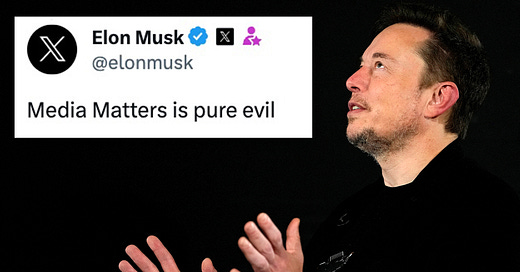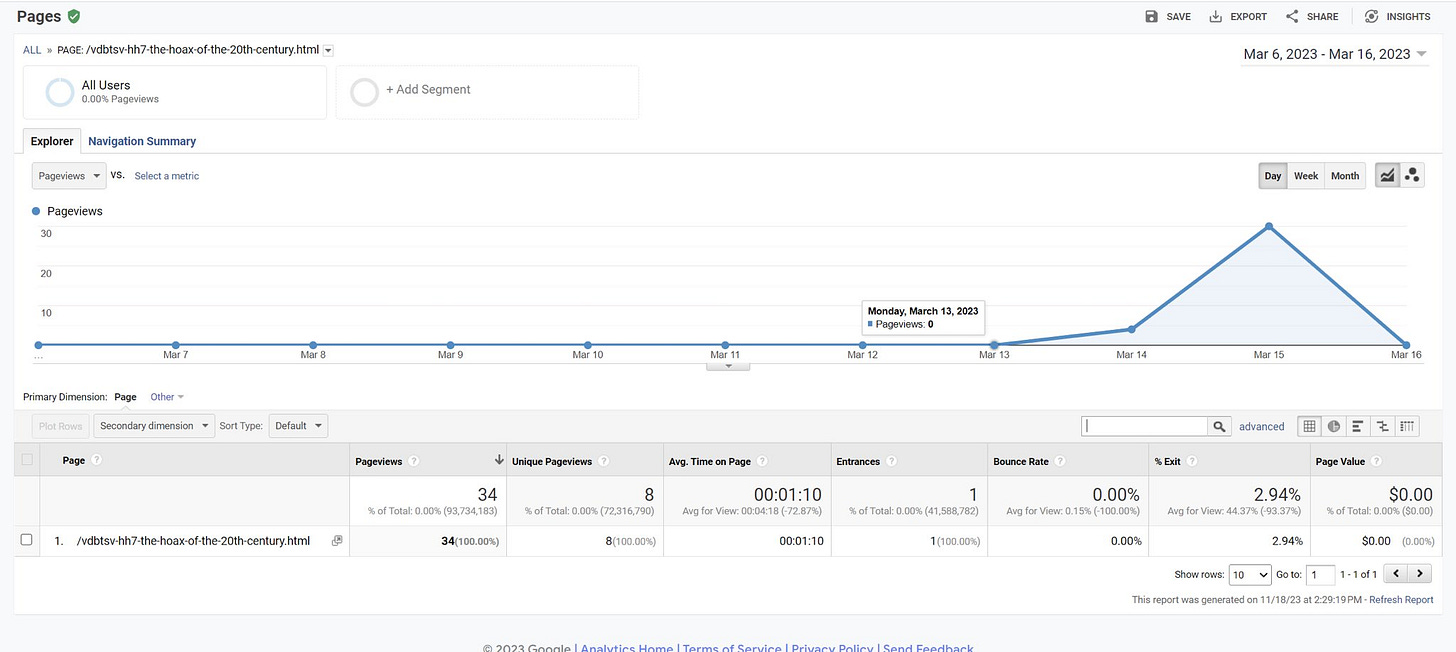Media Matters: a Cancer on Modern Journalism
David Brock, a political agent and general jerk, started Media Matters to give money to Democrats in power and attack anyone who criticizes them.
The censorship regime that has emerged in the West as a direct result of both Brexit and the rise of Donald Trump is among the most powerful weapons utilized by the ruling class. One of the primary aspects of this journalistic cancer is a left-leaning nonprofit called Media Matters.
Media Matters is one of many liberal activist groups, specifically a Democratic Party activist group that has been around for a couple of decades now. The organization has historically been one of the most repulsive, deceptive and toxic organizations in political media, having been founded by David Brock, one of the most detestable individuals to have ever crawled out of the hellish muck of American politics into the media world.
Brock has been described by Time as "one of the most influential operatives in the Democratic Party," and his story is one of astounding yet confounding personal transformation.
In his early, lesser-known years, he penned OpEds about “campus Marxists," rushed to the defense of Clarence Thomas amidst his sexual harassment allegations, and even instigated "Troopergate," all the while being a tough critic of both Bill and Hillary Clinton. However, as the Clinton years were coming to an end, things took a dramatic turn, with Brock suddenly becoming a steadfast supporter of the Clinton machine.
He experienced this change of heart while writing a book titled The Seduction of Hillary Rodham, which was anticipated to be a hit piece similar to his writings on Anita Hill and Bill Clinton. However, the book took a different direction and displayed significant sympathy towards Mrs. Clinton.
In his next book, Blinded by the Right (2002), Brock claimed that he had suddenly reached “a turning point," alleging that he had thoroughly examined charges against the Clintons, could not find any evidence of wrongdoing, and did not want to make any more misleading claims.
Many onlookers on both sides of the political aisle remained skeptical; the Conservative Libertarian magazine National Review proposed the theory that since "no liberal source in the world would talk to Brock," he could not collect the kind of information he was after to erect a proper takedown of Hillary. National Review also suggested that while writing the book, Brock had been "seduced" by political operative Sidney Blumenthal, a senior advisor and general VIP in Clinton world.
We could speculate endlessly as to why Brock had such a sudden and drastic change of heart, but it is up to the reader to decide whether or not they believe it was Hillary’s altruistic charm that won him over or the devil’s bargain.
As author and independent journalist Glenn Greenwald put it:
“I don’t know what happened to David Brock, I don’t know what was done to him, but overnight he went from one of the most psychotic Hillary haters to someone who treats Hillary Clinton like a deity”
The consensus among the dregs of independent journalists is that Brock founded Media Matters as a way to funnel as much money as possible into the Democratic establishment as well as to create an effective media pressure group.
The organization would prove to be a powerful tool for the Clinton cartel; in 2008, when Hillary ran against Barack Obama, and again in 2016, Media Matters fought tooth and nail to ensure her victory at any cost. The outlet would attack anyone who was even slightly critical of Clinton. Brock went so far as to spend millions on creating a superPAC with the sole purpose of scouring the internet and confronting anyone who posted unflattering comments about Hillary.
As per the Los Angeles Times in May of 2016:
Hillary Clinton's well-heeled backers have opened a new frontier in digital campaigning, one that seems to have been inspired by some of the Internet's worst instincts. Correct the Record, a super PAC coordinating with Clinton's campaign, is spending some $1 million to find and confront social media users who post unflattering messages about the Democratic front-runner.
In effect, the effort aims to spend a large sum of money to increase the amount of trolling that already exists online.
It used to be that outlets would accurately describe Media Matters as a liberal or Democratic party activist group; today, however, establishment news rags like the Washington Post and the New York Times treat Media Matters as if they were the preeminent scholars of our time, incapable of folly in their relentless pursuit of objective truth.
This shift in treatment occurred as a direct result of the advent of Donald J. Trump and the America First contingent.
The International Fact-Checking Network and its unholy merger with the legacy media were essentially a response to anti-establishment populism, which involves not only Donald Trump and his followers but also a variety of groups of people who have lost faith in official narratives. This pool has now expanded to include supporters of Robert F. Kennedy Jr., Cornel West, and Vivek Ramaswamy, all of whom have expressed varying anti-establishment sentiments. (#)(#)(#)
It’s bad enough that they are blindly partisan, prioritizing the success of establishment Democrats regardless of how ineffective and corrupt they may be, but the way that they attack the opposition is deceitful and highly manipulative.
Basically, anything that even remotely threatens the liberal establishment and its orthodoxy is fair game for attacks from watchdogs like Media Matters; even the establishment GOP will sometimes fall under its protection. They do not fight their opposition through spirited debate, which would be the case in healthy media; the modus operandi now is to discourage and eliminate political debates altogether, wherever and whenever they crop up.
One of the most effective, yet intellectually dishonest ways that media watchdogs attempts to control the narrative is by labeling anything that detracts from establishment liberalism as racist, homophobic, antisemitic, white-nationalist, transphobic, etc. Another way they do this is by conducting dubious “studies” that they then use to support their own claims.
The epistemological faculties of modern society are severely lacking, and organizations like Media Matters capitalize on this fact. The profoundly unfortunate reality about public discernment is that a large bulk of the population will believe anything you write so long as it’s preceded by the words “study finds.” They are currently using this strategy to attack outlets and platforms that do not censor sufficiently in accordance with the demands of modern liberal orthodoxy.
Outlets like Media Matters, the ADL, or any of the litany of similar organizations attempt to enforce obedience by contacting corporations that advertise on platforms where free speech is allowed. They try to convince these corporations that advertising on such platforms may lead to misconstrual of them as being supportive of bigotry, hate speech, or any of the other terms that render something radioactive.
Recall Twitter, Facebook and Google of the past, when certain points of view were still allowed—points of view that organizations such as the ADL or Media Matters loathed the existence of—all it would take on the part of these pressure groups was a well-crafted and intimidating letter to get them to remove content. Now, with free speech platforms like “X” and Rumble, these groups have to get a little more crafty with their approach, as was the case with a recent attempt by Media Matters to get advertisers to pull out from both respective platforms.
The ADL and Media Matters are really interchangeable; they work closely together to police and gatekeep information. The ADL has been leading a very successful campaign against X, getting corporate advertisers to flee the platform in large numbers by proclaiming Musk to be an antisemite, something that is now demonstrably not true.
Related Reading - The Anti-Dissent League
In what many see as a self-protective move, Musk has recently caved on his “free-speech absolutism” and imposed a ban on terms and phrases like “decolonization” and “from the river to the sea," a move that caused the ADL to suddenly and dramatically change its tune about Musk.
This is the same organization, run by another Democrat operative, Jonathan Greenblatt, that for months had been obsessed with harassing and haranguing Elon Musk for not sufficiently cracking down on speech it deemed “hateful.” That’s how it works: these pressure groups slap any number of the various toxic labels on you, and the only way to accomplish that is to publicly appease them by caving in to their demands.
The number of people who see these types of organizations for what they are has been steadily increasing over the last 7 years, and now, with recent headlines, there may be an opportunity to get substantially more people hip to the playbook.
And now, the real story unfolds: Media Matters has been caught in quite the pickle itself.
Earlier, we discussed Media Matters conducting their own dubious studies to support their highly partisan, pro-establishment claims. They purported to prove that major advertisers were regularly associated with neo-Nazi or antisemitic content, but upon the slightest scrutiny, their “proof” was rendered laughable and has since led to the “thermonuclear lawsuit” filed by Elon Musk that you’ve undoubtedly already read about.
In the immediate wake of the lawsuit’s announcement, Rumble founder Chris Pavlovski made an announcement of his own, saying that Rumble would “go thermonuclear as well.”
The Media Matters “study” that kicked off this latest attempt to force X into bankruptcy was attached to a mouthful of a headline reading, “As Musk endorses antisemitic conspiracy theory, X has been placing ads for Apple, Bravo, IBM, Oracle, and Xfinity next to pro-Nazi content."
(If you care to read the piece for yourself, you can do so here.)
The first intellectually dishonest thing about this article comes in the very first sentence, where the author assures the readers that Elon Musk is in the midst of a “descent into white nationalist and antisemitic conspiracy theories" and then, of course, fails to elaborate or bring compelling receipts for the claim.
The argument that Elon Musk suddenly became “far-right” and is an “antisemitic white nationalist” engaged in “conspiracy theories” is built on the fact that he purchased Twitter with the intention of making it a free speech platform, the way that it was in the beginning.
One of the consequences of having a platform where people can voice their opinions is that sometimes you will have to see opinions that you might disagree with or find reprehensible. As the Twitter Files have shown us, it is by far more dangerous to have the federal government and intelligence agencies colluding with big tech to determine what conversations the public can and cannot engage in.
Yes, it’s true that there are bigoted and generally mean-spirited comments on Twitter now that free speech is somewhat more upheld on the platform, but there were bigoted and mean-spirited comments back before Musk took over, though they were typically directed at Christians or supporters of Donald Trump.
The article goes on:
During all of this Musk-induced chaos, corporate advertisements have also been appearing on pro-Hitler, Holocaust denial, white nationalist, pro-violence, and neo-Nazi accounts. Yaccarino has attempted to placate companies by claiming that “brands are now ‘protected from the risk of being next to’ potentially toxic content.”
But that certainly isn’t the case for at least five major brands: We recently found ads for Apple, Bravo, Oracle, Xfinity, and IBM next to posts that tout Hitler and his Nazi Party on X.
They then proceed to take screenshots of ads appearing beside posts that could certainly be seen as Neo-Nazi in nature.
Notice that, comparatively, virtually nobody sees the problematic tweets. Do you see what they did here?
They are going to tweets that exist on the most remote fringes of the platform and refreshing their feeds incessantly until they get one of these ads to appear so that they can bag the desired screenshot.
How many of the insignificant number of views that these obscure, anonymous posts have accrued came as a result of the Media Matters staff? Should we completely torpedo the freedom of speech and spirited debate over something so obviously manufactured and inconsequential?
Below is a statement by Pavlovski claiming that Media Matters ran the exact same kind of hit job on Rumble earlier this year.
An article published back in March claimed that “Ads for Netflix are appearing next to Holocaust denial videos on Rumble." I highly encourage you to read it and really digest what he’s saying.
The following is the traffic report for the video referenced in the Media Matters smear. The MM employee was the only human who saw the instance of this video with the Netflix ad, and the average time spent watching this video is 00:01:10.
How many people do you think were converted into violent, hateful Holocaust deniers from that one minute of content?
What’s almost depressingly hilarious about this is that, by Media Matters’ own logic, they are actually guilty of promoting Holocaust denial content.
As you can see in the image above, the aforementioned video was receiving zero engagement until the 14th of March, the day that the Media Matters article was published. It rose by roughly five views, peaking at thirty views the following day, all of those views being a direct result of the Rumble smear.
If I were completely devoid of integrity and decided to conduct a hit in the style of Media Matters, I would write up something like, “Media Matters causes a 3000% increase in Holocaust denial media consumption overnight.”
Considering that Holocaust denial content constitutes less than 0.001% of the videos hosted on the platform, do you really think that Media Matters is concerned about the spread of Holocaust denial? Or is Media Matters concerned because the majority of Rumble's hosted content criticizes the establishment Democrats and Republicans it was created to protect and support?
Despite the flaws in Media Matters' claim, Netflix pulled their advertisements from Rumble out of fear of being labeled antisemitic, achieving the intended result. If you can drive away a platform’s advertisers, then you essentially have the power to destroy the platform altogether.
The lawsuit against Media Matters, the statement from Pavlovski, and the open investigation by Texas Attorney General Ken Paxton are all signs that the boomerang is coming back around to David Brock and Media Matters.
Let’s hope that institutions like the Poynter Institute, the ADL, the SPLC and the Center for Countering Digital Hate (CCDH) will all receive their own day of legal judgment.
Media Matters, and all other organizations like it, are symptoms of journalism’s slow, agonizing death.
It’s late-stage liberalism at its finest, where the orthodoxy fulfills its purpose and devours everything in the name of liberation; in this case, it seeks to liberate us from the burden of having our own thoughts.











